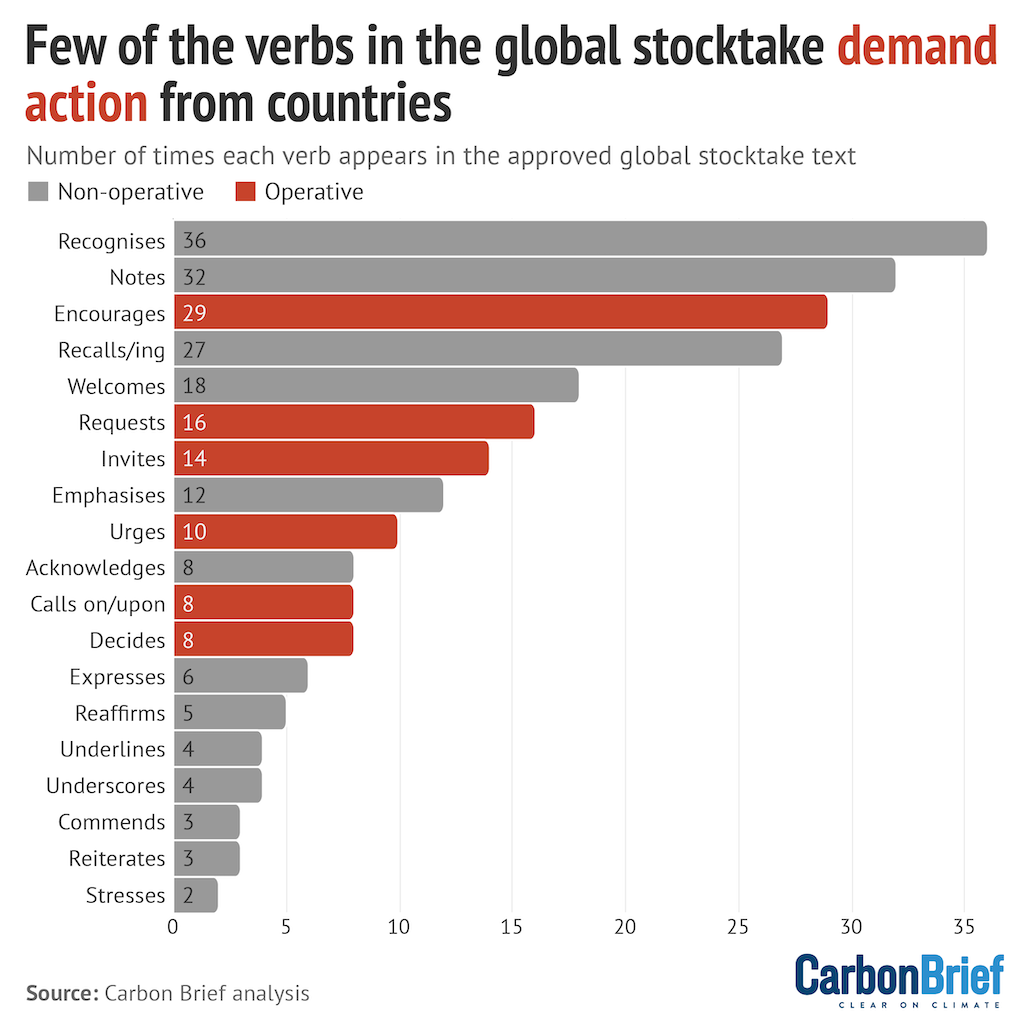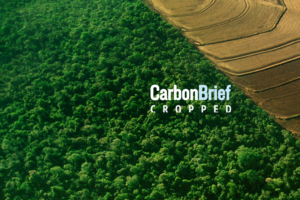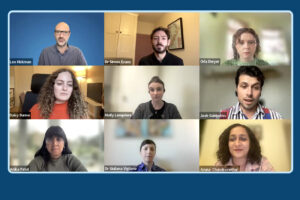
COP28 DeBriefed 15 December 2023: Carbon Brief’s key takeaways; Food, forests and nature; Free webinar today
Multiple Authors
12.15.23Welcome to the final COP28 special edition of DeBriefed, an essential guide to all the key developments at the Dubai climate talks. Subscribe to DeBriefed here for free.
This week
Global stocktake
FOSSILS AWAY: Nearly 200 countries have agreed to help the world “transition away from fossil fuels”, as part of the “global stocktake” decided at COP28, according to Carbon Brief’s in-depth summary of the talks. The deal “call[ed] on” all countries to contribute, using the weakest-possible UN legal language to ask for action. Yet even this was hard-won, with an earlier draft deal having left action on fossil fuels entirely optional.
WHITHER FINANCE? The stocktake also called for the tripling of renewables, doubling of energy efficiency and “substantially reducing” methane emissions, all by 2030. These targets ticked four of the five “pillars” to keep 1.5C in reach, set out by the International Energy Agency (IEA) ahead of COP28. The crucial fifth pillar – finance for developing countries, which could have unlocked greater ambition elsewhere – was largely missing.
‘MOMENT OF TRUTH’: COP28 agreed new targets, but only countries can deliver action. The stocktake “encourages” them to submit ambitious new 2035 pledges aligned with 1.5C, with a deadline of 2025. This will be the “moment of truth”, one expert told Carbon Brief.
ACTION STATIONS: The stocktake also launched a four-year “dialogue” on implementing the deal, as well as “mission 1.5C”, designed to boost “ambition…action and implementation”. This mission will be run by COP30 hosts Brazil – who said it would work towards cutting fossil fuel dependence – along with the UAE COP28 presidency and COP29 host Azerbaijan. The role of the “mitigation work programme” – launched at COP26 to “urgently scale up mitigation ambition and implementation in this critical decade” – remains unclear.
FREE WEBINAR: Carbon Brief’s team of journalists will be available to answer questions on the global stocktake – and all of the other key outcomes of COP28 – during a free webinar taking place at 3pm UK time today. Register here.
Adaptation
MONEY TALKS: Negotiations over a “framework” to guide a “global goal” on climate adaptation faced significant tensions. African countries and others said they needed strong commitments that developed countries would financially support them. The US and the EU did not want to discuss money. Large, emerging economies were accused of blocking talks by insisting on references to the different responsibilities facing developed and developing countries.
NEW FOCUS: The final text did not contain any of the developing countries’ major priorities. Parties agreed to focus adaptation on several key themes and decided on a handful of ill-defined targets. However, it kick-starts a formalised global effort for countries to scale up their adaptation efforts, with a first round of planning and reporting given a deadline of 2030.
Loss and damage
FUND AGREED: Nations launched a new “loss-and-damage fund” on day one of COP28, in what one observer called a “diplomatic coup” for the UAE. This was welcomed as the first time a major outcome had emerged from a COP opening session. It marked the culmination of a decades-long effort by climate-vulnerable nations to secure funds for the unstoppable harm caused by climate disasters.
MONEY NEEDED: With no obligation to pay into the fund, filling it will largely depend on the generosity of wealthy countries. Several parties, including the UAE, Germany and the EU, kick-started the fund with $770.6m of pledges, some of which were existing funds that had been re-pledged. Campaigners pointed out this amounted to less than 0.2% of developing countries’ annual needs.
Emirati leadership
OVERSHADOWED PRESIDENCY: COP28 president and oil executive Dr Sultan Al Jaber hailed the “world-first” achievement of getting “fossil fuels” in a UN climate change agreement. However, his presidency was overshadowed by allegations the UAE intended to use COP28 to make oil-and-gas deals – and by resurfaced remarks he made questioning the science of a fossil-fuel phase-out at an online event on the need to include women in climate action.
‘LOW-CARBON’ OIL: Mere hours after the summit, Al Jaber told the Guardian that his company, the Abu Dhabi National Oil Company (ADNOC), will continue investing in oil. He claimed to the paper that his oil can be considered “low-carbon” because it is “extracted efficiently and with less leakage than other sources”.
Food, forests and nature
FOOD: Carbon Brief has just published a separate in-depth look at what COP28 delivered for food, land, forests and nature. “Food day” at COP28 saw the launch of the Alliance of Champions for Food Systems Transformation – a group of five countries committed to pushing the agenda of systemic change in food systems. But the Sharm el-Sheikh joint work on agriculture and food security failed to reach an agreement, leaving parties frustrated.
FORESTS: The global stocktake “emphasises” that halting and reversing deforestation and forest degradation by 2030 will be key to meet the goals of the Paris Agreement – the first time such a pledge has garnered formal recognition in a UN climate change legal text. Several countries put forward new ideas for protecting forests at COP28, but Brazil stole the show with its $250bn “tropical forests forever” fund proposal.
NATURE: COP28 hosted an unprecedented number of high-level events on the links between climate change and nature loss. In a first-of-its-kind initiative, COP28 president UAE and COP15 president China released a Joint Statement on Climate, Nature and People acknowledging the interconnected nature of climate change and biodiversity loss, signed by 20 countries. The world’s landmark nature deal agreed in 2022, the Global Biodiversity Framework, was also referenced in a UN climate change text for the first time.
Around the COP
- FOSSIL FUELS: New fossil-fuel pledges dominated the start of COP28, with the US among nine new countries to sign up to the Powering Past Coal Alliance – and Kenya, Samoa and Spain signing up to the Beyond Oil and Gas Alliance.
- RENEWABLES: Some 130 countries pledged to triple installed renewable capacity and double the rate of energy efficiency improvements by the end of COP28. Notable exceptions include China and India.
- METHANE: Turkmenistan – a major methane emitter – and other countries joined a pledge to cut global methane emissions by 30% by 2030 at COP28. The US, China and UAE held a methane summit and more than $1bn was put forward to reduce emissions of the potent greenhouse gas.
- HEAVY INDUSTRY: Some 36 countries joined a new alliance led by Germany and Chile to cut emissions from heavy industry, such as steel and cement making.
- GENDER BIAS: A COP28 presidency image celebrating the outcome of the summit featuring a large group of men raised eyebrows, including with Spain’s ecological transition minister Teresa Ribera and UN greenwashing tsar Catherine McKenna.
23
The number of hours COP28 went into overtime, making it the 13th longest UN climate summit.
Latest climate research
- In npj Ocean Sustainability, a group of ocean scientists examined the inequities in their field and proposed ways to address these gaps.
- A new study, published in Communications Earth & Environment, found that seagrass meadows off the coast of the Bahamas store as much as 590m tonnes of organic carbon in the top metre of sediment.
- By 2100, up to 18% of species in south-east Asia could become regionally extinct under a “business-as-usual” deforestation scenario, according to research published in the Proceedings of the National Academy of Sciences.
(For more, see Carbon Brief’s in-depth daily summaries of the top climate news stories on Monday, Tuesday, Wednesday, Thursday and Friday.)
Captured

UN climate change texts can be difficult to interpret for countries, observers and journalists alike. One way to glean deeper meaning from the texts is to examine the type of verbs that they use. According to Carbon Brief analysis, the global stocktake text agreed at COP28 uses few “operative” verbs – words that demand action from countries (shown in red on the chart above). What’s more, the key passage on fossil fuels merely “calls on” countries to take action. As Carbon Brief’s editor Leo Hickman noted, this is the weakest of all of the terms that COP texts can use to invite countries to act.
Watch, read, listen
PIPE DREAMS: An Al Jazeera documentary released before COP28 looked at the East Africa Crude Oil Pipeline and what major oil projects mean for Uganda.
COLOMBIA LEADS: A Bloomberg feature examined how Colombia led from the front at COP28 and became the first major coal producer to join a group of nations calling for a fossil-fuel non-proliferation treaty.
LINE HELD: UK climate justice activist Asad Rehman wrote in the Guardian that the agreement on a fossil fuel phase-out had “more loopholes than a block of Swiss cheese”.
Coming up
- 15 December: International Energy Agency (IEA) Coal 2023 report launch
- 17 December: Serbian parliamentary elections
- 18 December: Green Alliance event on what COP28 means for UK politics
- 20 December: Democratic Republic of Congo presidential and national assembly elections
Pick of the jobs
- The Wildlife Trust, digital content officer | Salary: £26,500 (pro-rata £15,900). Location: Remote
- The Eden Project, chief marketing officer | Salary: £80,000. Location: Cornwall
- BloombergNEF, European carbon analyst | Salary: Unknown. Location: London
- Office of the High Commissioner of Human Rights (OHCHR), special rapporteur on human rights in the context of climate change | Salary: Unpaid, except for travel expenses and daily subsistence allowance on “mission”. Location: Flexible
DeBriefed is edited by Daisy Dunne. Please send any tips or feedback to [email protected]




